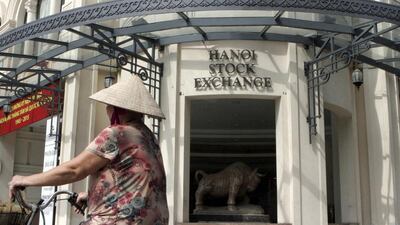Vietnam’s feel-good story is persuasive and compelling, yet there remains one corner of the economy that remains stuck in first gear: the country’s capital markets.
Seven per cent economic growth last year has not, as yet, fuelled a surge in share prices. Through the first quarter of this year, the Hanoi Stock Exchange remained pretty much flat, with the Ho Chi Minh Stock Index down 3 per cent over the same three-month period. To be sure, both bourses have recovered handily from a woeful start to the year. Yet it does beg the question: why are local equities performing so poorly, given the wider context of an economy in rude health? To many the answer is simple: there just are not enough good, well-run and undervalued securities to go around. One domestic fund manager says Vietnam “lacks enough good stocks. There are too many stodgy state firms listed on the domestic stock exchanges and too few vibrant young private enterprises.”
Bill Stoops, the chief investment officer at Ho Chi Minh City’s Dragon Capital, says the “shallow nature of the local capital markets” constituted a “key factor acting as a drag on the rest of the economy”.
Despite the economy growing at just shy of 7 per cent last year, new share issuance slowed to a virtual halt. Just one initial public offering worth US$49.3 million was completed across both onshore bourses in 2015, according to data from Thomson Reuters, against two worth $156.6m the previous year.
And that single stock sale, completed by Airports Corporation of Vietnam, hardly took the markets by storm, given that it involved the listing of just 3.47 per cent of the equity of one of the country’s largest state firms.
Here, the government finds itself speared on the horns of a dilemma. On the one hand, it really wants to list shares in leading state-run enterprises to raise capital, shift assets off its books and broaden and deepen the investor base.
Yet it also fears a resulting loss of control: after all, without state vehicles to oversee, what would be the point of an all-powerful, single ruling party? Something, sooner or later, will have to give. Last year, the government said it wanted to raise up to $1.5 billion a year by selling down stakes in state enterprises. In June 2015, the premier Nguyen Tan Dung promised to scrap foreign ownership limits, which currently cap how much of a state-owned enterprise a foreign corporate, or group of investors, can own.
But progress is being made. Private equity groups ranging from Warburg Pincus to CVC Capital Partners to Standard Chartered Private Equity are pushing hard into the market, setting up offices and looking to cut deals.
Jonathan Bowden, a partner in Singapore at White & Case, says he “expects strategic investment by buyout firms across a variety sectors” to become a regular occurrence over the years to come. Foreign funds are also pushing in, looking for undervalued assets. The £91 million (Dh471.96m) London-based Advance Frontier Markets Fund is heavily skewed toward Vietnamese securities, which make up 15.1 per cent of its portfolio – the largest single country weighting.
Adrian Pop, a Hong Kong based portfolio manager at emerging market-focused East Capital, says he is “constantly seeking to increase” his firm’s exposure to Vietnam via the firm’s two frontier market and emerging Asia funds. And institutional changes are in the wind. The Hanoi Stock Exchange is preparing to join forces with the Vietnam Securities Depository to launch the country’s first derivatives market and integrated clearing house, most likely in the final quarter of the year.
Finally, a slew of privately run firms are queuing up to sell shares at home or overseas. VietJet Air, the nation’s sole private carrier, hopes to raise up to $800m from an IPO in Hong Kong or Singapore by the end of the third quarter, with 30 per cent of the sale earmarked for foreign investors. MobiFone is planning an IPO that could value the telecommunications firm at up to $4 billion.
But the big sea-change will come when the government cracks and starts to sell off its crown jewels. One state firm has already come to market in 2016 – the giant foodstuffs processor Vissan, which raised $41m in Ho Chi Minh City in the first week of March.
One swallow does not make a summer, of course. But it is a good start.
business@thenational.ae
Follow The National's Business section on Twitter

